Reggae music, pristine beaches, great coffee, excellent cuisine, delicious rum, and lush nature — in short, Jamaica has a lot to offer. But, is this Caribbean island country safe?
The answer is a firm no. Jamaica is notoriously unsafe, and the police force simply can’t or won’t deal with the widespread occurrences of crime in the country.
Let’s take a more in-depth look at safety in Jamaica in terms of crime, transport safety, natural disasters, and more.
Are you planning a last minute trip to Jamaica? We’ve put together all the resources you’ll need for a fun & safe travel:
🛌 Best & Safest Places to Stay in Jamaica:
👉 Terra Nova All Suite Hotel – Outdoor swimming pool, Airport shuttle, Bar
👉 Moon Palace Jamaica – Free WiFi, Daily housekeeping, Garden
👉 S Hotel Jamaica – Fabulous breakfast, 2 swimming pools, Bar
👉 GoldenEye – Outdoor swimming pool, Free WiFi, Private beach area
⛱️ Fun Activities & Tours in Jamaica:
👉 Private Tour from Montego Bay to Dunn’s River Falls and Blue Hole
👉 Friday Evening Kingston Harbour Cruise
👉 Chuck Norris Secret Falls and Dunn’s River Falls
🚗 Best & Safest Jamaica Transportation Services:
👉 Airport Pickup Service – Welcome Pickups
👉 Rent a Car – DiscoverCars
🙏 Stay Safe While Travelling:
👉 Safetywing (for medical insurance)
👉 VisitorsCoverage (for trip insurance)
Is Jamaica Safe?

Here’s a short preview of Jamaica’s safety:
- Travel advisory: All travel advisories consider Jamaica a very unsafe destination.
- Crime rate: Crime in Jamaica is very high at 74.85.
- Dangerous areas: There are more than 40 places that you should avoid visiting in Jamaica, including famous tourist hubs like Montego Bay and Kingston.
- Police presence: The police force of Jamaica is notoriously unreliable and ineffective.
- Natural Disasters: Jamaica is at risk from tropical storms, hurricanes, earthquakes, and tsunamis.
- Public transport: The public buses and the unlicensed taxis are a big problem in Jamaica.
- Medical care quality: The medical care in Jamaica is good in the cities and major tourist hubs, but slow and scarce in rural areas.
Travel Advisory for Jamaica
The Canadian and Australian travel advisories place Jamaica in the level-2 safety category, recommending that travelers exercise a high degree of caution due to a high presence of crime.
The US travel advisory is even stricter, placing Japaica in the level-3 safety category, urging visitors to postpone their travels to Jamaica for safety time.
International travel advisories emphasize that the country is dangerous to the local population and foreign visitors alike. What makes Jamaica a dangerous country to visit are the following:
- High levels of violent crime.
- Petty theft like bag snatching, and pickpocketing.
- Fraud and scams, including ATM, credit card, romance, and lottery scams.
- Assault, harassment, and negative attitudes towards women and the LGBTQI+ population.
- Active presence of gangs in the country, particularly in popular tourist destinations like Kingstone and Montego Bay.
- Extremely dangerous and crime-infested areas that are completely off-limits for foreign visitors.
- An ineffective and unresponsive local police force.
- Even the guarded hotels, motels, and resorts are not completely safe and off-limits to criminals.
A Comprehensive Look at Jamaica’s Crime Rates
Jamaica has a very high crime rating of 74.85.
Jamaica’s rating is high in all types of crime—everything from petty crimes like theft to more violent ones like attacks.
Jamaica’s capital Kingstone has a crime rating of 78.82, while the major tourist hub Montego Bay has a slightly lower (but nevertheless high) rating of 77.88.
The Global Organized Crime Index shows that Jamaica has the 2nd highest organized crime rate in the Caribbean and the 14th highest organized crime rate in the Americas.
Particularly concerning is the fact that Jamaica is number one in both the Caribbean and Latin America in the number of homicides per 100,000 people — 52.9. It tops Venezuela and Trinidad and Tobago by no less than almost 13 homicides.
| Crime | 2022 | 2023 |
| Homicide | 351 | 280 |
| Shooting | 271 | 232 |
| Persons injured | 258 | 211 |
| Rape | 129 | 65 |
| Robbery | 233 | 160 |
| Break-in | 227 | 203 |
Hotspots of Violent Crime
The most worrying aspect of the crime situation in Jamaica is the fact that is present everywhere, even in the famous tourist areas of Montego Bay and Kingston.
Some places are absolutely off-limits for visitors, places where your life is constantly under threat. These places include:
- Kingston: August Town, Arnett Gardens, Balmagie, Cassava Piece, Delacree Park, Denham Town, Drewsland, Felstead Pen, Four Miles, Glendale, Grant’s Pen, Greenwich Town, Hannah Town, Harbour View, Hunts Bay, Jones Town, Lower Cockburn Gardens, Maverly, Mountain View, Nanse Pen, Olympic Gardens, Payneland, Portmore, Rennock Lodge, Riverton City, Salmagie, Seaview Gardens, Tavares Gardens, Tivoli Gardens, Tower Hill, Trench Town, Waltham Gardens, West Kingston, Whitfield Town
- St Catherine: Central Village, Ellerslie, Homestead, Ravensworth, Spanish Town, Tawes Pen
- Montego Bay: Bottom Pen, Canterbury, Flankers, Hart Street, Mount Salem, Norwood Gardens, Rose Heights, St Clavers Avenue
- South Coast: May Pen
Police Presence in Jamaica
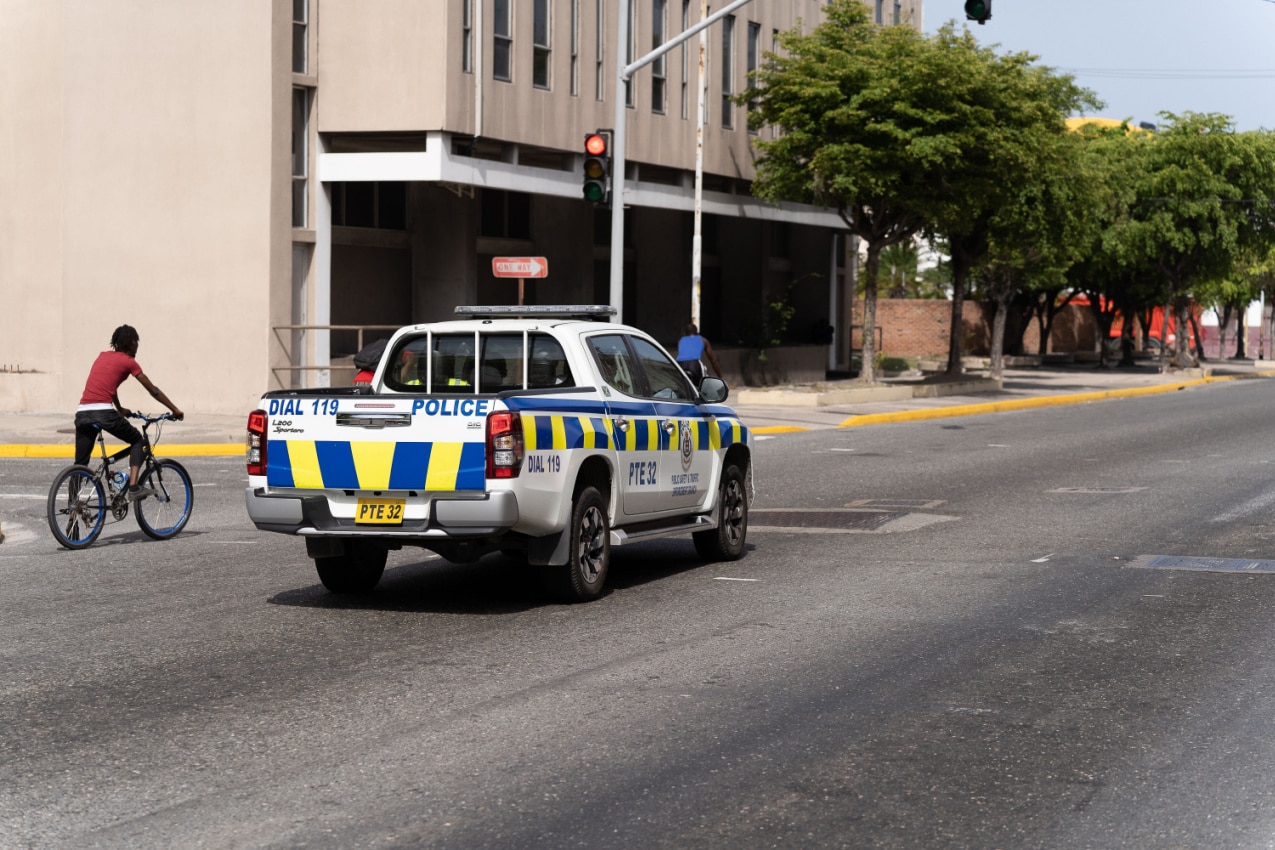
Jamaica is protected by the Jamaica Constabulary Force, the official police force of the country.
They have headquarters in five cities:
- Area One: Trelawny, St. James, Westmoreland, Hanover
- Area Two: St. Ann, St. Mary, Portland
- Area Three: Clarendon, Manchester, St. Elizabeth
- Area Four: St. Andrew Central, St. Andrew South, Kingston Western, Kingston Central, Kingston Eastern
- Area Five: St. Andrew North, St. Catherine South, St. Catherine North, St. Thomas
Unfortunately, they are not very reliable. The US travel advisory is pretty decisive about their lack of effectiveness and reliability: the “local police often do not respond effectively to serious criminal incidents. When arrests are made, cases are infrequently prosecuted to a conclusive sentence.”
Still, you must cooperate with the local police force in case you have a problem. We recommend that you first contact the offices of the Jamaica Tourist Board. They have headquarters throughout the whole island and direct radio contact with the police.
Because of the rampant presence of crime in the country, the police force is often compelled to declare a state of emergency in some parishes. The state of emergency is usually called when they are attempting direct police action against gangs and other forms of organized crime. During that period, they have the right to conduct seizures, searches, and detain suspects.
Is it Safe to Travel Solo in Jamaica?
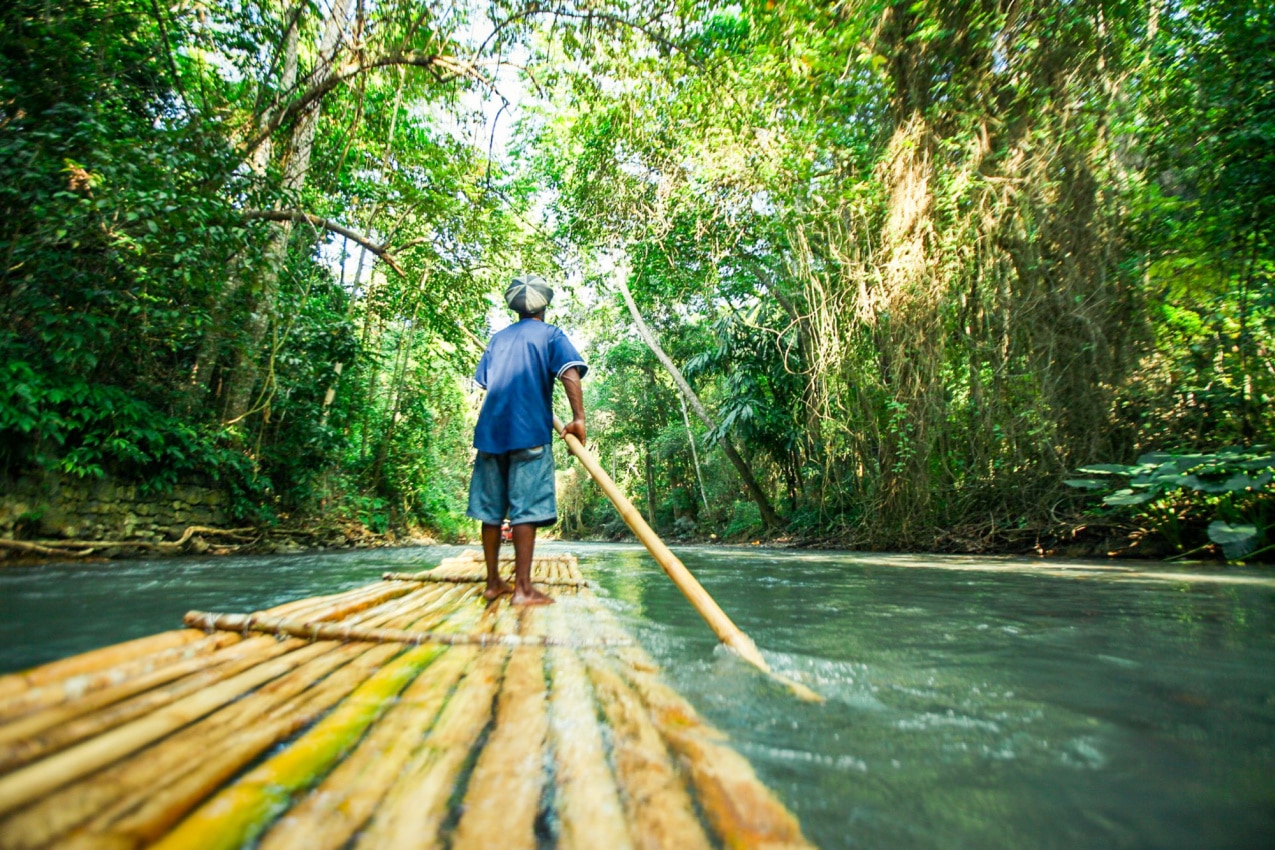
Jamaica is a dangerous country and unsafe for solo travelers. Women and queer (LGBTQI+) visitors to Jamaica are particularly vulnerable to violent crimes.
Is it Safe to Travel in Jamaica as a Family?
Jamaica is unsafe for families and children. Even the resorts and hotels that are usually considered safe havens for families are susceptible to crime.
Perils of Nature: The Risk of Natural Disasters in Jamaica
Jamaica is at risk from tropical storms, hurricanes, earthquakes, and tsunamis.
Hurricane Information and Precautions
Jamaica, along with the entire Atlantic basin, the Gulf of Mexico, and the Caribbean Sea, is part of the so-called Atlantic hurricane belt and thus susceptible to hurricanes.
According to historical records, Jamaica is hit by a hurricane every 10 to 11 years. A hurricane gets close without actually reaching the island every four to five years.
Since 2000, Jamaica has experienced two direct hits, both by level-4 hurricanes: first, by hurricane Ivan in 2004, and then by hurricane Dean in 2007. Hurricane Ivan killed 17 people in Jamaica and caused an estimated material damage of over half a million dollars. Dean was slightly weaker, and it killed around 12 people in Jamaica.
Generally speaking, the wider Atlantic region is hit by around 12 tropical storms every year. About half of them become hurricanes with wind speeds of around 74 mph. Only a quarter of them reach level three status, with wind speed of nearly 111 mph. Luckily, not all of them reach Jamaica.
NOAA (the National Oceanic and Atmospheric Administration) predicts that the Atlantic region will experience between 14 and 21 tropical storms, 6-11 hurricanes, and 2-5 strong hurricanes in 2024. It’s unclear whether any of them will make landfall in Jamaica.
The riskiest part of the year is between June and November, the official duration of the hurricane season. The period between December and May, on the other hand, has been hurricane-free for 300 years (since 1700).
The US Travel advisory offers some great advice if you plan on visiting Jamaica during the hurricane season, particularly if you find yourself in the middle of a strong storm:
- Join in the Smart Traveler Enrollment Program (STEP) for security and safety updates
- Prepare a kit of necessary items, such as non-perishable foods, bottled water, medicine, and a battery-powered radio
- Obtain travel insurance
- Monitor all the local media, including the local radio and news reports
- Follow the updates on the National Hurricane Center
- Inform your friends and family about your whereabouts, and keep regular communication with the staff of the hotel or resort you’re staying at
Earthquake and Tsunami Information and Precautions
According to the Canadian travel advisory, Jamaica is part of an active seismic region and is thus subject to earthquakes and tsunamis.
As you probably know, these two natural disasters are closely connected — tsunamis are caused by earthquakes and can manifest within several hours of the first tremor.
Jamaica has a long history of earthquakes:
- The infamous Port Royal earthquake of June 7, 1692 killed more than 2,000 people and sank a whole chunk of the well-known pirate town. There haven’t been any earthquakes of that magnitude in recent history.
- On March 1, 1957, a strong earthquake affected most of western Jamaica, particularly the St. James parish. It resulted in three fatalities.
- Finally, on January 28, 2020, a relatively strong earthquake hit western Jamaica. It caused some structural damage but no casualties.
As for a future prognosis, the earthquake hazard in the country is classified as “medium,” which means there’s no more than a 10% chance of a potentially dangerous earthquake occurring in the area in the next 50 years.
If an earthquake happens while you’re in Jamaica, the Canadian travel advisory gives the following advice:
- Monitor local media to stay informed of the situation as it evolves.
- Follow the instructions of local authorities, including evacuation orders.
- Follow Latest earthquakes – U.S. Geological Survey for constant updates.
Although travel advisories point to the risk of tsunamis in Jamaica, tsunamis are historically quite rare in the region. WorldData.info confirms that tsunamis occur rarely.
Still, stay up-to-date with the latest information by following these websites:
Beware the Silent Threat: Carbon Monoxide Poisoning in Jamaica
Luckily, there are no reported cases of carbon monoxide poisoning in Jamaica, so it’s not something you should worry about.
That being said, more and more people (including the management of resorts and hotels) are wary of the dangers posed by this invisible, odorless, and tasteless poisonous gas, especially after the Sandals resort tragedy in the Bahamas in 2022.
The problem with CO poisoning is that victims usually realize they’re in danger after it’s too late. Headaches, vomiting, and stomach aches are common symptoms that can eventually lead to paralysis and loss of life.
To err on the safe side, you can bring a portable CO detector (which costs around $20) on your trip to Jamaica.
Jamaica Weather Patterns: What to Expect
Jamaica has a tropical climate. It’s hot year-round, with small temperature variations. Generally speaking, the period between December and March is cooler, while April to October is rainy, hot, and stuffy.
As Jamaica is a mountainous country, the temperatures vary according to the elevation. Obviously, it’s warmer on the flatlands and near the coast, and colder on higher altitudes.
Roughly speaking, spring and winter are the dry seasons, while summer and autumn are the wet seasons when rain falls in downpours or thunderstorms.
Monthly Average Temperatures and Rainy Days in Kingston, Jamaica
| Month | Temperature (High and Low) | Rainy Days |
| January | 73° / 88°F (23 / 31°C) | 5 days |
| February | 73° / 88°F (23 / 31°C) | 5 days |
| March | 73° / 87°F (23 / 31°C) | 5 days |
| April | 75° / 89°F (24 / 31°C) | 7 days |
| May | 77° / 89°F (25 / 32°C) | 8 days |
| June | 78° / 91°F (26 / 33°C) | 7 days |
| July | 78° / 92°F (26 / 33°C) | 6 days |
| August | 78° / 92°F (25 / 33°C) | 9 days |
| September | 78° / 91°F (25 / 32°C) | 11 days |
| October | 77° / 90°F (25 / 32°C) | 14 days |
| November | 76° / 90°F (24 / 31°C) | 10 days |
| December | 74° / 89°F (23 / 32°C) | 6 days |
Dry Season
The dry season is from December to May. The weather is dry and warm, but in relation to the other parts of the year, the temperatures are slightly lower. February is considered the driest month of the year.
Interestingly enough, the period between December and March is when “Norte” — as Jamaicans call the north wind coming from the US — visits the country. Although it decreases the temperatures slightly, that’s mostly felt during the mornings and nights.
The dry season is also the tourist season. This is because the weather is ideal for swimming, hiking, bobsledding down Mystic Mountain, and sailing.
With May — the rainiest month of spring — the dry season slowly comes to a close.
Wet Season
The wet season starts in May and lasts till November. It’s hot, stuffy, humid, and very rainy. October is the rainiest month of the year, followed by September and November.
Although summer is part of the wet season, the sun still shines and the number of rainy days — particularly in July — is not very high. The rain mainly falls in downpours, which can be strong, but usually don’t last too long. It’s still a great time to visit Jamaica weather-wise since you can still sunbathe, swim, raft, or whitewater tube.
Fall, on the other hand, is the heart of the wet season and thus low tourist season.
If you find yourself in Jamaica on rainy days, don’t worry – you can still visit some museums and landmarks in Kingston. Jamaica has a vibrant and rich history and a versatile and colorful culture.
How to Stay Safe in Jamaica
- Never take photos of Rastafari individuals or cannabis fields without explicit permission, as it angers the local population
- Always wear a hat and plenty of sunscreen — the Jamaican sun is brutal
- LGBTQI+ people should be particularly careful — there are homophobes in Jamaica.
- LGBTQI+ people should avoid displaying affection publicly
- Neve use dating apps since they’re used for scams
- Switch up your movement routine as much as you can to prevent thieves from learning your habits
- Avoid walking or driving at night
- Stay away from secluded places
- Don’t use public transportation or unlicensed taxis
- Don’t bring weapons — that offense is punishable by law in Jamaica
- Stay away from dangerous areas
- The possession of up to two ounces of cannabis is not a crime. Everything more than that is punishable by law
- Smoking cannabis in a public space is illegal
- Taking cannabis or any other narcotic outside of the country is illegal
- Public nudity and swearing is illegal
- Camouflage clothing is illegal
- If you’re being robbed don’t resist
- Don’t carry valuables with you
- Always keep an eye on your drink, as spiking is common
Emergency Numbers
- Police: 119
- Air-Sea Rescue: 119
- Ambulance: 110
- Coast Guard: (876) 967-8031/8223/8190-3 Kingston (876) 973-3256 Discovery Bay
- Fire: 110
- Hurricane Update: 116
- Office of Disaster Preparedness and Emergency Relief: (876) 928-5111/4
Public Transportation Safety in Jamaica
According to the Canadian travel advisory, Jamaican public transport is not safe, mostly because of overcrowding and high crime levels.
Public buses are especially dangerous and unreliable. They are quite unsafe and a common site of petty thieves and pickpockets; they’re unreliable and usually not on time; and they are sometimes used by the driver and local passengers for private purposes.
Luckily, there’s a safe, reliable, and comfortable option for intercity travel: Knutsford Express. Unfortunately, it can’t help you navigate within cities.
The taxi situation is slightly better – but beware. Unmarked and unregistered taxis are very dangerous. There are cases of people especially women being robbed and taken advantage of in unlicensed taxis.
Instead, the Canadian and the Australian travel advisories recommend that you use marked and authorized taxis, which are both safe and reliable. You can identify them by the “PP” license plate colored in red and white, and by the green JUTA (the Jamaica Union of Travellers Association) sticker on the car. Private vehicles have white license plates with blue letters and numbers.
The safest thing to do is ask the employees of your hotel to call you a taxi. Arrange the price before the drive begins to prevent potential scams.
Medical Care Quality in Jamaica
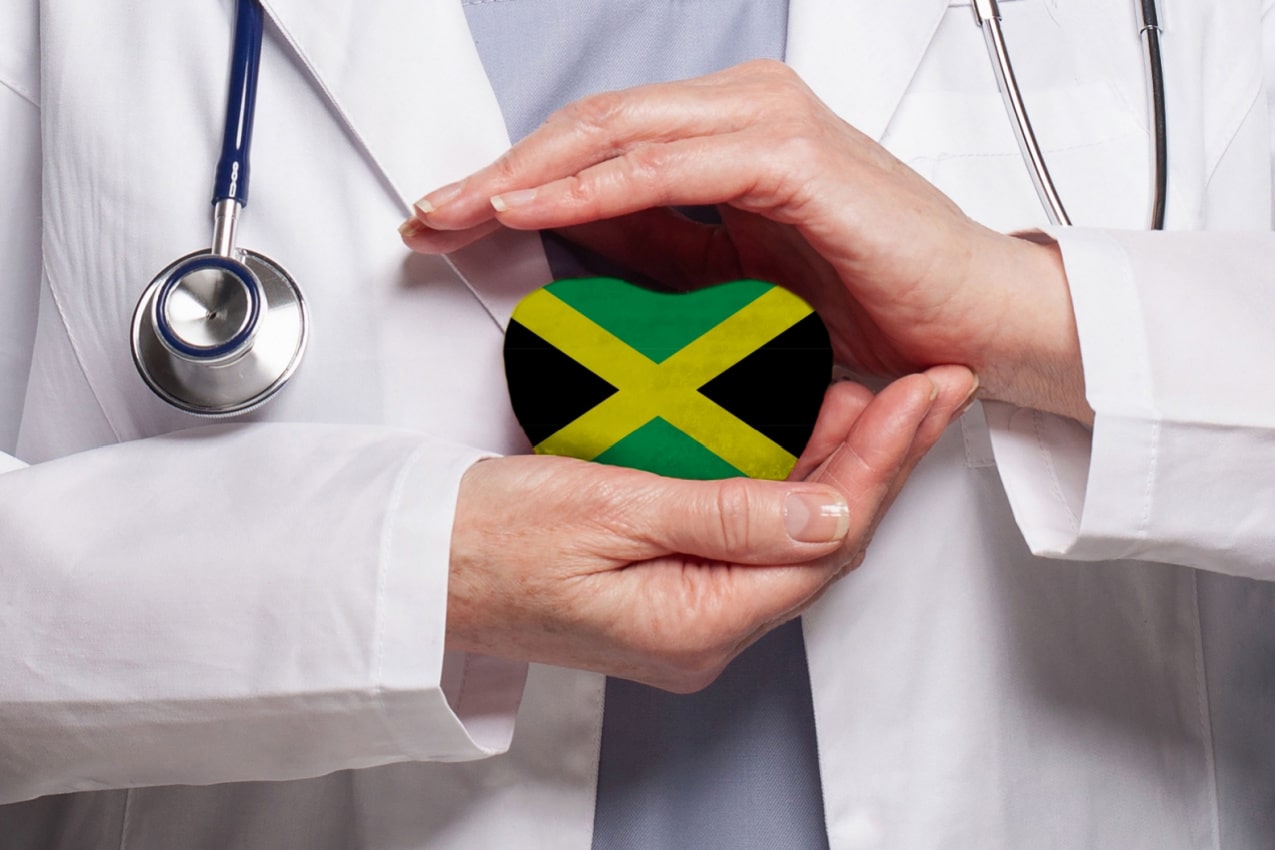
Finally some good news! The quality of medical facilities, both in Kingston and all the major tourist hubs, ranges from good to excellent.
Still, while the services provided by the hospitals are decent, they may be considered substandard compared to the US. The US travel advisory paints the following picture of the downsides of the Jamaican health system:
- Health facilities may be below U.S. standards, especially when it comes to mental health care and specialty care.
- Public medical clinics lack basic resources and supplies.
- Generally, in hospitals, only minimal staff is available overnight in non-emergency wards
- Patients bear all costs for transfer to or between hospitals.
- Psychological and psychiatric services are limited, even in the larger cities, with hospital-based care only available through government institutions
Generally speaking, the quality of medical care is significantly better in the popular tourist areas and in larger cities than in smaller towns and villages. If you’re far from urban areas, it’s better to call a taxi than to wait for the ambulance, since the emergency vehicles are not effective, and the roads are quite bad.
Finally, the Canadian travel advisory warns that private medical establishments might be very expensive and that they might require payment upfront. Medical evacuations too, are very expensive.
So make sure you get travel insurance before traveling to Jamaica.
Untmost Vigilance if Traveling to Jamaica!
Unfortunately, Jamaica is quite an unsafe holiday destination. Despite the unique culture, stunning beaches, and endemic natural beauty, it has serious problems with:
- High crime rate
- Dangerous areas and neighborhoods in popular tourist locations like Kingston and Montego Bay
- Unreliable and unsafe police
- Risks from tropical storms, hurricanes, earthquakes, and tsunamis
- Unsafe taxis and public buses
- Limited quality of medical care
Despite all these drawbacks, if you travel with a group, during the dry season, and exercise extreme caution, you may just end up enjoying the country without getting squished by the unpleasant underbelly.
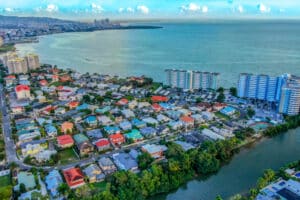
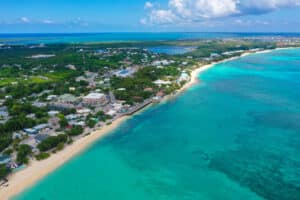
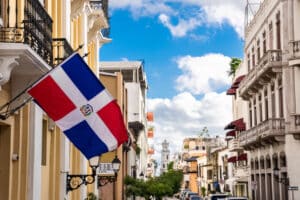
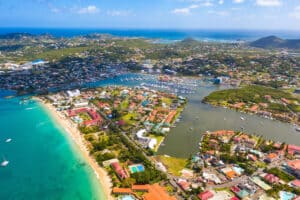
Jamaica is a very safe place to visit.
Visited Jamaica 2023,may.
Never got any single problem.
People are friendly,the resort we stayed at was very safe…opened 24/7.
Very secure and lovely.
I recommend visitors to get tour guides for even safer stay.
Jamaica is beautiful.
Will go back soon.
My gosh. You really did your Thesis on Jamaica. I won’t go into specifics but you are right and wrong on certain things. Some things are over exaggerated but l really admired your knowledge. First of all Jamaica is not worse than anywhere else. Most of the happenings are ” crimes of opportunity “. Everyone must take stock of their surroundings. There are do’s and don’ts everywhere you go. Exercising caution is a must. Take the time and go to Jamaica and interview people in most areas. It’s not bad as how you portray it. Go to Jamaica with someone who is from there and you will experience the best time of your life. My advice to others, get a local guide. Jamaica is among the top tourist destinations in the Caribbean. There is a reason for that. Walk good mi dear.
Hello Alex, I really appreciate your productive feedback here. This article has touched a nerve with many and we’ve received a fair amount of feedback. However, much of it was not as constructively written as yours. So, we didn’t publish those comments. People appreciate their home or homeland. I get it and I love that pride. That said, we have a responsibility to portray the overall information that is available and the reality for travelers of all ages and types to a destination.
Many people say “it’s not that bad”, “it’s just contained to this area”, or “it’s just gang activity”. The reality of the numbers and the crime data tells a different story. In fact, the United States government just raised the seriousness of their travel advisory on their scale recently.
Thus, while we understand the pride and passion that current/former Jamaicans and other fans have for this country, it would be irresponsible and incomplete for us to just paint an overlay rosy and unrealistic picture of the concerns and dangers involved.
I will continue to publish all constructive feedback, tips, and other useful advice for travelers to Jamaica from our community. But, those that react emotionally and want to just slam what we report that is based on established facts are going to be ignored. Thanks again, Alex, we really appreciate you taking the time to write and share your constructive thoughts.
Jamaica has always have crimes, I travel there many many times with no problem. Jamaica has crimes just like any where else, rape, robbery. scams is in America more than anywhere else in the world. More rape, school murder children in America, gun violence in America no than anywhere. Jamaica is no different the whole world is a mess. Police in Jamaica will not help in certain situations alternative lifestyle is not welcome there Jamaica is capital punishment. Been that way from the beginning. It will NOT change. Don’t go there it’s NOT safe for some people. Please don’t go there they WILL DIE for their beliefs, they will NOT change. It’s NOT safe.
Harry Belafonte would not agree.
Down away where the night s are gay and the sun shines daily on the mountIn top ——‘